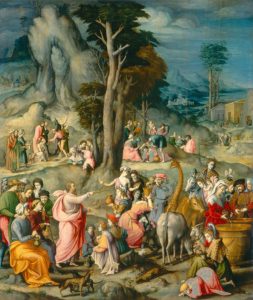Thoughts on Sunday’s Lessons for Aug. 4, 2024 (Pentecost 11B/Proper 13)

The Gathering Of Manna (c.1540-1555), oil painting on panel by Francesco d’Ubertino Verdi, called Bachiacca (1494-1557). Samuel H. Kress Collection, National Gallery of Art, Washington, D.C. (Click image to enlarge.)
First Reading (Track One): 2 Samuel 11:26-12:10, 13-15
Last Sunday we heard the shocking story of King David raping the beautiful Bathsheba, then arranging to have her husband, Uriah, killed in battle so David could have Bathsheba for himself. Now we hear the rest of the story. The prophet Nathan, sent by God, tells David about a rich man who selfishly took and slaughtered a poor man’s beloved lamb. Angry, David curses the rich man and threatens to have him killed, only to hear Nathan’s charge, “You are the man!” A merciful God threatens David with serious punishments but spares his life. In the verses just after this passage, though, Nathan foretells that the child of David’s illicit union shall die.
First Reading (Track Two): Exodus 16:2-4, 9-15
From God’s gift of manna to God’s gift of grace through Jesus, our Track Two readings over the next few weeks focus on bread – the bread of life – as metaphor for God’s abundant love. In last Sunday’s First Reading, when the Prophet Elisha fed 100 people with a few small barley loaves, he recalled God promising the people that “They shall eat and have some left.” This week we turn back to the verses in Exodus of which Elisha spoke, when God provided abundant manna, a gift of bread in the desert.
Psalm (Track One): Psalm 51:1-13
Echoing the context of King David’s adultery and murder, this psalm’s powerful narrative envisions David wracked in repentant guilt as he confronts his great sin. In poetic words that mirror the promises of God’s covenants with the people, David pours out his shame and grief. He makes no excuses for his wicked acts, but begs for God’s mercy and forgiveness. “Create in me a clean heart, O God,” David begs: a clean slate upon which God can write a new covenant of love.
Psalm (Track Two): Psalm 78:23-29
Recalling God’s gift of manna to the people in the desert, the Psalmist gives thanks to the Creator, who saw the people’s need and poured down on them all the bread and quails that they could eat: God gave them what they craved and filled them up. The earlier verses of this Psalm, not included in Sunday’s reading, remember that God made a covenant with the people and led them out of slavery. Setting the scene for this passage, they recall how God cared for the people, and, despite their ungrateful complaints and rebellion, God set aside divine anger and fed them with love.
Second Reading: Ephesians 4:1-16
The author of the Letter to the Ephesians offers life lessons in poetic language. These phrases remind us of Paul’s memorable passage in 1 Corinthians, in which Paul speaks of the church as Christ’s body, within which each of us functions according to our gifts. Here, too, all are called to work together with humility and gentleness, in unity as one body and one spirit, “one Lord, one faith, one baptism, one God and Father of all.”
Gospel: John 6:24-35
The crowds around Jesus continue following him around the shores of Galilee. Having watched his miraculous healings and shared in the bountiful loaves and fishes, they are fascinated by this remarkable rabbi. They want to know more about him, but Jesus tells them that they just want more bread. Don’t fret about the world’s bread that does not last, Jesus tells them. Beginning an extended discussion about the bread of life that we will hear in readings from John’s Gospel through August, Jesus declares, “I am the bread of life. Whoever comes to me will never be hungry, and whoever believes in me will never be thirsty.”
